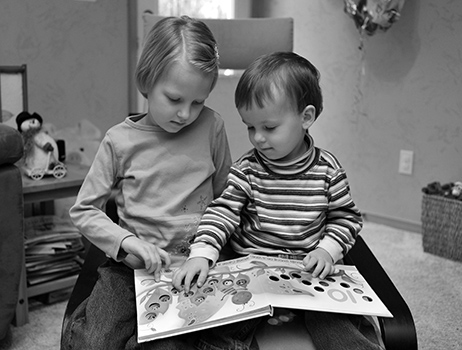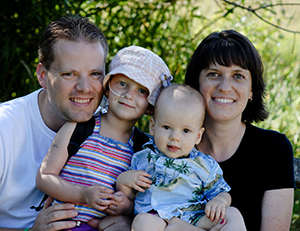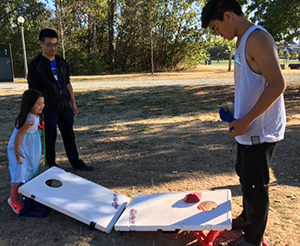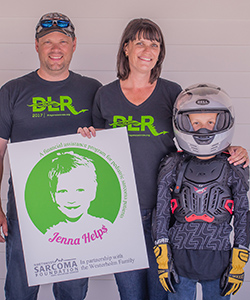
In February 2006, Chris and Michele Westerholm’s 2 1/2-year-old daughter, Jenna, was diagnosed with rhabdomyosarcoma – a cancer made up of cells that normally develop into skeletal muscles. At the time, Michele was 11-weeks pregnant with her son Braden.
“It was frightening to imagine what life would be like, having a child with cancer and a newborn,” Michele said. “I didn’t have the time or the energy to plan for adding a new baby to our family.”
Over the next three years, Jenna endured chemotherapy, radiation and two major surgeries at Seattle Children’s.
“Jenna spent most of her life at Seattle Children’s,” Michele said. “We still consider it a second home with many doctors and nurses who loved us along the way.”
Meanwhile, Braden learned to crawl and walk in Seattle Children’s Cancer Care Unit.
“Thankfully, Braden was a very easy-going baby and added so much joy to our lives during a difficult time. He brought so much love and happiness to Jenna’s final days,” she said.
Tragically, Jenna died on Jan. 22, 2009. Braden was 2 1/2 years old.
“I remember, a week after Jenna died, Braden was sitting on the couch listening to some of her favorite songs and he suddenly asked, ‘Where did Jenna go?’ We had told him she had died many times, but he was too young to understand death is final,” Michele said.
A few weeks later, while Michele and Braden were playing outside, Jenna’s former school bus stopped at their street to let kids off. Braden asked, “When is Jenna coming home from school?”
Braden’s questions about his sister would not wane over time, but Michele learned how to cope with her loss, and found support for her son, through Seattle Children’s Journey Program.
A unique support system

The Journey Program was created in 1987 with a donation from the Liska family. Their child, Ann Liska, was a cardiology patient at Children’s for many years. After her death, and the subsequent death of her grandfather, the family approached Seattle Children’s to establish a program for grieving families, like themselves.
Today, the Journey Program offers support to any family who has experienced the death of a child through support groups, counseling and resources.
Chris and Michele started going to a Journey Program support group for parents eight months after Jenna died.
“The support group taught us we were not alone,” Michele said. “We were never judged or told what we were feeling didn’t make sense. It was one of the only places where we could cry, or even laugh, without hesitation.”
Not just for parents

While the Journey Program is most commonly recognized for its parent services, it also supports the siblings of deceased children.
“Children who have witnessed death, especially the death of a sibling, are forever changed,” says Kelsey Mitchell, a pediatric grief coordinator for the Journey Program.
Kids are impacted differently at each age group, Mitchell noted. A preschooler might have a hard time understanding death, but they know their routine has changed, and that can be really challenging for them. They don’t necessarily have the language skills to explain what’s going on, but they feel grief. Young, school-aged children can experience increased separation anxiety. They can feel their grief physically, with symptoms like increased stomachaches or headaches.
“Parents might not always recognize how their child grieves, but our grief support experts can help,” Mitchell said.
The Journey Program hosts events for siblings experiencing grief, including movie nights, picnics and holiday parties. Occasionally, program organizers host art workshops, in which children will create “memory boxes” with their sibling’s photo or items they loved.
“Siblings who participate in events sponsored by the Journey Program gain the opportunity to meet other kids who are ‘like them,’” Mitchell said. “It makes them feel less alone in their grief and promotes a sense of normalcy to be around others, like them, who they can share their story with.”
“There were kids there just like me”
Braden was 5 years old when he went to his first sibling grief workshop. Before he attended, Michele helped him write a letter to Jenna.
“He wrote about how much he missed her, how he missed playing with her and that she taught him how to dance,” Michele remembered. “It allowed him to honor his sister in his own way, without us telling him how he should feel.”
At the workshop, Braden tied his letter to a red balloon and let it go “up to his sister.” Chris and Michele watched as Braden squealed with delight when his balloon floated into the sky.
On the way home, Braden told his parents, “There were kids there just like me.”
Braden is now 11 years old, and Michele said he still looks forward to attending Journey Program events.
“Death is hard for the outside world to talk about, so to have a safe place like this is so important,” she said.
How to parent a grieving child

Braden continues to mourn his sister, and the fact that he can no longer remember her. At school, when the topics of siblings come up, he sometimes bursts into tears.
“I’ve learned kids who experience a loss, like Braden, experience a new wave of grief at each developmental milestone as their understanding of death matures,” Michele said. “Sometimes, it is exhausting to help him through each stage, especially since we, as parents, have so much to work through ourselves. But the Journey Program has helped us support Braden through his grief.”
Remembering Jenna
The Westerholm family honors Jenna’s memory every day by telling stories, looking at photos, or just missing her and the love she brought to our family, Michele said.
“The Journey Program has offered us hope when we needed it the most, reiterating the fact that grief should be shared and that together we can survive,” she said.
The Journey Program’s annual memorial service will be held Sunday, June 3, 2018. Any family who has experienced the death of a child is welcome to attend. Families interested in learning more about this event may email [email protected].
Resources
- Seattle Children’s Journey Program
- Helping your child deal with death

